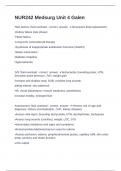NUR242 Medsurg Unit 4 Galen
Risk factors: fluid overload - correct answer ✔•Excessive fluid replacement
•Kidney failure (late phase)
•Heart failure
•Long term corticosteroid therapy
•Syndrome of inappropriate antidiuretic hormone (SIADH)
•Water intoxication
Diabetes Insipidus
Hypernatremia
S/S: fluid overload - correct answer ✔tachycardia, bounding pulse, HTN,
decrease pulse pressure, JVD, weight gain
increase and shallow resp; SOB, crackles lung sounds
pitting edema, skin pale/cool
HA, visual disturbance, muscle weakness, paresthesia
increase motility, enlarged liver
Assessment: fluid overload - correct answer ✔•Assess risk r/t age and
diagnosis, history (overhydration, CHF, kidney disease)
•Assess vital signs: bounding tachycardia, HTN, dysrhythmias, tachypnea
•Assess lung sounds (crackles), weight, LOC, JVD
•electrolytes imbalance and signs and symptoms
skin/extremities/abdomen/sacrum area for edema
•Assess perfusion: edema, peripheral/central pulses, capillary refill, skin color,
temp, sensory and motor function
urine output
,Labs: fluid overload - correct answer ✔•Serum osmolality (285-295
mOsm/kg)
•Decrease found in overhydration < 285; and < 265 is critical finding
•CBC
•Decrease hemoglobin and hematocrit
• < BUN
•Electrolytes
• < sodium
•Urine specific gravity Decrease < 1.005
Interventions: fluid overload - correct answer ✔•Goal: reduce excess body
fluids, promote desired elimination
-Monitor skin also around mask/nasal cannula, position changes,
•Manage underlying cause
•Restrict dietary sodium intake
•Monitor I/O - daily wt. >3lb gain/week or 2lbgain/24hrs: call CP
•Administer diuretic
-ECG patterns
•Monitor client's s/s and electrolytes values
•Restrict oral and other fluid intake as prescribed
Complications: fluid overload - correct answer ✔•Isotonic overhydration
•HF and pulmonary edema
•Seizure
•Coma
, Medications: fluid overload - correct answer ✔Furosemide
Mannitol
S/S: dehydration - correct answer ✔•Vital signs: Increased: HR, BP, RR
hyperthermia, ST, thread pulse, hypotension, decrease CVP
<skin turgor, dry/scaly, dry mucous membraines
•Neuromusculoskeletal: Dizziness, syncope, confusion, weakness, fatigue
•GI: thirst, dry furrowed tongue, N/V, anorexia, weight loss
< urinary outpt
•Other signs: Diminish capillary refill, cool clammy skin, diaphoresis, sunken
eyeballs, flat neck vein
Assessment: dehydration - correct answer ✔•Assess for condition leading to
dehydration: diarrhea, poor intake, vigorous exercise, vomiting, polyuria, fluid
losses (burns, trauma) clients with drains/NG tube, burns/fluid shifts, overuse
of diuretic
Labs: dehydration - correct answer ✔•Serum electrolytes (hypernatremia)
•Increased serum osmolality normal 275- 295 mOsm/kg; elevated > 295 found
in dehydration; > 320 is critical finding
•CBC elevated H/H
•Elevated urine specific gravity > 1.030
•Increased BUN
Interventions: dehydration - correct answer ✔•Goal of interventions: replace
fluid and electrolytes to achieve homeostasis
•Closely monitor status and rehydration, avoid overcorrection
•Monitor I/O and weight




